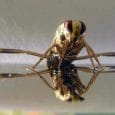Antibody Treatment Shields Fetus From Zika in Mice
Human-derived protein shows promise, but must still be tested in human trials
WebMD News from HealthDay
By Dennis Thompson
HealthDay Reporter
MONDAY, Nov. 7, 2016 (HealthDay News) — An antibody derived from the blood of Zika-infected people may have the potential to protect developing fetuses from the ravages of the virus, a new study with mice suggests.
The antibody, called ZIKV-117, protected fetal mice from a Zika infection in their pregnant mothers, said co-senior researcher Dr. James Crowe, director of the Vanderbilt Vaccine Center in Nashville.
"The antibody treatment will clear the virus in the mother, but also protect the fetus, which is very important," Crowe said.
The antibody is only a short-term antiviral treatment, but the researchers said it demonstrates the potential of a Zika vaccine to provide people long-lasting immunity against the virus.
"No study so far has shown in any model that you could actually treat pregnant animals that are infected with Zika and protect the fetus," said co-senior researcher Dr. Michael Diamond, a professor of medicine and infectious diseases with Washington University in St. Louis. "This is the first study to do this, and it suggests that vaccines should work as well because vaccines induce antibody responses."
The researchers hope to proceed to human clinical trials for the antibody therapy within a year, Crowe said. They are currently making plans to test the antibody treatment in monkeys.
Zika virus produces a relatively mild infection in adults, with only one in every five people showing any symptoms at all, according to the U.S. National Institutes of Health.
Instead, Zika poses the biggest health threat to the fetus. That's because the virus causes severe birth defects including microcephaly, where babies are born with too-small skulls and underdeveloped brains.
More than 2,000 children have been born with microcephaly or birth defects of the central nervous system in Brazil, the nexus of the Zika outbreak in South America, according to the World Health Organization.
To find a treatment for Zika, Crowe and his colleagues isolated antibody-producing immune cells from the blood of three people who previously had been infected with the virus.
From those immune system cells, the researchers obtained and then screened 29 different anti-Zika antibodies.



